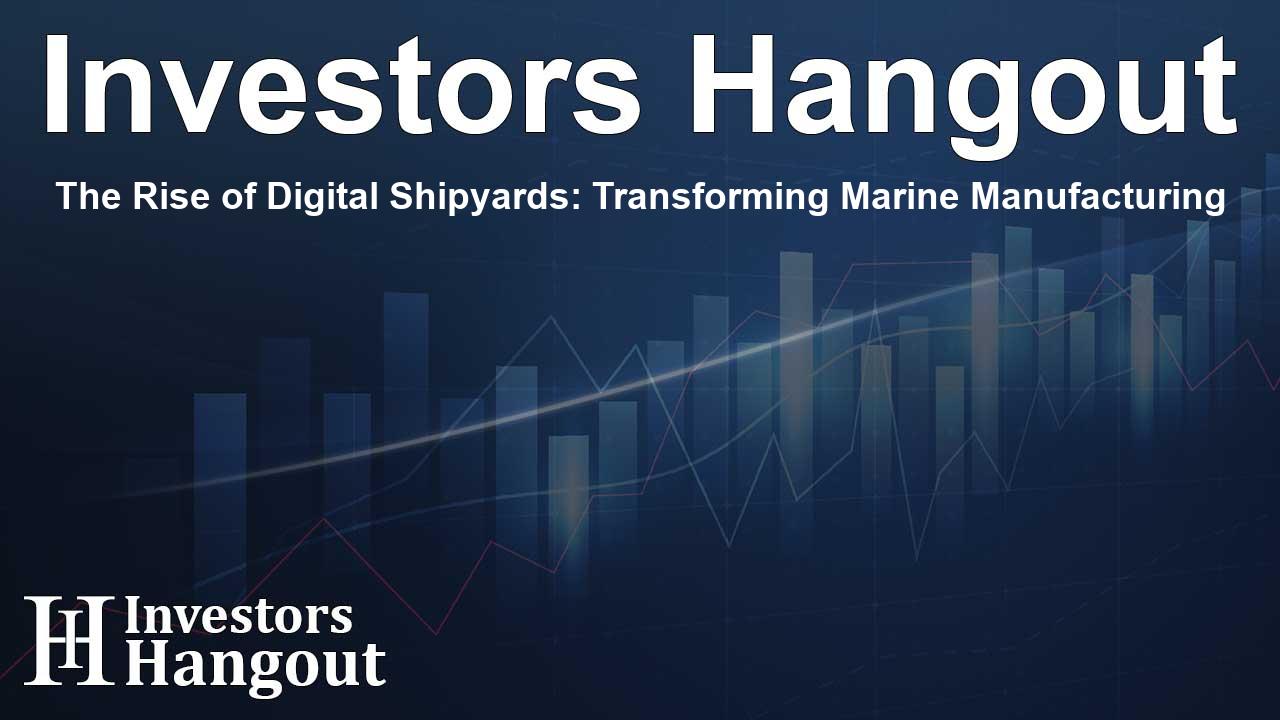The Rise of Digital Shipyards: Transforming Marine Manufacturing

Understanding the Digital Shipyard Market Growth
The digital shipyard market is set to become a significant player in the marine industry, with projections indicating an impressive growth from USD 1.3 billion in 2022 to USD 5.5 billion by the year 2030. This growth reflects a compound annual growth rate (CAGR) of 19.1%, a clear indicator of the increasing reliance on digital technologies to enhance shipbuilding processes. Major technologies driving this evolution include artificial intelligence, machine learning, Internet of Things (IoT), and additive manufacturing. These innovations are vital in improving coordination and efficiency among shipbuilders, cutting down on the time and costs associated with production.
The Impact of Digital Technologies on Shipbuilding
Digital shipyards utilize cloud-based solutions that streamline workflows related to manufacturing, maintenance, and support. Traditionally, many shipyards operated on legacy systems that utilized compartmentalized data, often outdated and inefficient. The shift towards modern digital solutions is crucial; it ensures that crew members and maintenance teams have access to real-time data throughout the ship's lifecycle, enabling better decision-making and operational efficiency.
Advantages of Digital Transformation
The digital transformation of shipyards provides numerous advantages, including streamlined design processes, improved engineering capabilities, and enhanced manufacturing planning. By integrating these technologies, shipyards can ensure a smoother workflow from the design phase through maintenance and training, making the entire shipbuilding experience more efficient and less prone to costly errors.
Leading Companies in the Digital Shipyard Space
Several key players are at the forefront of revolutionizing the digital shipyard market. Companies such as Siemens, Dassault Systèmes, SAP, and Accenture are notable for their contributions to this field, each bringing unique strengths and innovations to the table.
Siemens: Pioneering the Digital Shipbuilding Landscape
Siemens is known for its broad and integrated portfolio that encompasses various aspects of the ship lifecycle. They provide comprehensive solutions that range from initial design to production and operational efficiency. Siemens leverages advanced technologies to navigate the complexities of the marine industry effectively, continuously expanding its offerings to solidify its market position.
Dassault Systèmes: Innovating Across Industries
Renowned for providing a 3D experience to various sectors, Dassault Systèmes enhances the shipbuilding process through its vast array of technologies. Their business platform facilitates a seamless transition from the ideation phase to when the ship enters service. By acquiring startups with cutting-edge software solutions, Dassault aims to strengthen its position as a chief solutions provider in the marine industry.
Digital Shipyard Market Dynamics
The dynamics of the digital shipyard market are influenced by various factors, including increasing adoption of Product Lifecycle Management (PLM) solutions. Outdated data management practices in traditional shipbuilding often hamper productivity. However, PLM solutions present new methodologies to optimize design and engineering processes, ultimately leading to enhanced collaboration and productivity among shipbuilders.
Opportunities for Growth
The introduction of augmented reality (AR) into shipbuilding can significantly elevate operational efficiency. AR technologies offer immersive experiences while providing hands-free access to critical data, which can lead to more effective quality checks throughout the shipbuilding process.
Challenges Facing the Industry
Despite the promising advancements, the digital shipyard market faces regulatory challenges that can hinder progress. Key stakeholders, including manufacturers, suppliers, and service providers, must navigate these regulatory frameworks while continuing to innovate and expand their digital capabilities.
Conclusion
As the demand for more efficient and cost-effective shipbuilding processes grows, the digital shipyard market is poised for significant transformation. By leveraging innovative technologies and embracing digital solutions, the industry can overcome existing challenges and achieve remarkable growth, reinforcing the essential role of digital shipyards in the modern marine sector.
Frequently Asked Questions
1. What is the projected growth of the digital shipyard market?
The digital shipyard market is expected to grow from USD 1.3 billion in 2022 to USD 5.5 billion by 2030, reflecting a CAGR of 19.1%.
2. Which technologies are driving the digital shipyard transformation?
Key technologies include artificial intelligence, machine learning, IoT, and additive manufacturing.
3. Who are the major players in the digital shipyard market?
Significant companies include Siemens, Dassault Systèmes, SAP, and Accenture.
4. How does digital transformation improve shipbuilding processes?
Digital transformation streamlines workflows, enhances efficiency, and reduces production time and costs.
5. What challenges does the digital shipyard market face?
The market encounters challenges mostly related to stringent regulatory frameworks and adapting to new technologies.
About The Author
Contact Addison Perry privately here. Or send an email with ATTN: Addison Perry as the subject to contact@investorshangout.com.
About Investors Hangout
Investors Hangout is a leading online stock forum for financial discussion and learning, offering a wide range of free tools and resources. It draws in traders of all levels, who exchange market knowledge, investigate trading tactics, and keep an eye on industry developments in real time. Featuring financial articles, stock message boards, quotes, charts, company profiles, and live news updates. Through cooperative learning and a wealth of informational resources, it helps users from novices creating their first portfolios to experts honing their techniques. Join Investors Hangout today: https://investorshangout.com/
The content of this article is based on factual, publicly available information and does not represent legal, financial, or investment advice. Investors Hangout does not offer financial advice, and the author is not a licensed financial advisor. Consult a qualified advisor before making any financial or investment decisions based on this article. This article should not be considered advice to purchase, sell, or hold any securities or other investments. If any of the material provided here is inaccurate, please contact us for corrections.
